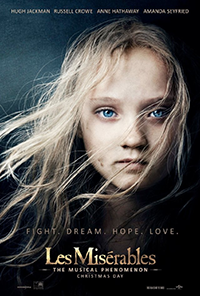Les Misérables, directed by Tom Hooper. Written by William Nicholson and Alain Boublil. Based on the stage musical by Alain Boublil and Claude-Michel Schonberg, in turn based on the 1862 novel by Victor Hugo. Starring Hugh Jackman, Russell Crowe, Anne Hathaway, Amanda Seyfried, and Eddie Redmayne. Rated PG-13 for suggestive and sexual material, violence, and thematic elements. Running Time: 158 minutes.

Les Misérables, the recent film adaptation of the beloved musical based on Victor Hugo’s epic novel, carries viewers through a sweeping tale of revolution, romance, and redemption. Set in 19th-century France, the film captures the drama and hardship of life during a time of revolutionary turmoil while providing a testament to the inner hero of man and his capacity to live as an embodiment of his values.
The film opens with the release of ex-convict Jean Valjean (Hugh Jackman) on parole from a nineteen-year prison sentence he suffered for stealing a loaf of bread and repeatedly attempting to escape. Valjean attempts to resume a normal life under the watchful eye of his nemesis, the rigid Inspector Javert (Russell Crowe). Valjean soon realizes that the only way he can be truly free is to violate his parole, disappear, assume a new identity, and begin his life anew.
In fleeing his parole, Valjean infuriates Inspector Javert, who vows never to rest until he has captured Valjean and administered “justice.” From this point on, Javert’s pursuit of Valjean dominates much of the story; however, numerous other story lines develop as well, the most important involving Valjean’s adoption of Cosette (Amanda Seyfried). Cosette’s mother, Fantine (Anne Hathaway), is thrown into abject poverty when a foreman at Valjean’s factory unjustly terminates her employment. Eventually Valjean learns of Fantine’s plight and vows to care for Cosette, whom he showers with love.
The story leads to the June Rebellion of 1832 in Paris, as young revolutionaries try to cast off the yoke of monarchical rule following the Second French Revolution of 1830. At this point, viewers meet Marius, Enjolras, and their fellow student rebels who attempt to draw all of Paris—including Valjean and Cosette—into their stand against the injustices imposed by the monarchy.
Valjean is an enormously inspiring character, and this aspect of the film is its greatest strength. Despite his lowly beginnings and torturous time in prison, Valjean overcomes his circumstances to become a successful, principled, and moral hero. Valjean ultimately lives the productive and fulfilled life of a man aiming to bring happiness to himself and to those he loves.
In addition to its moving and engaging plot, Les Misérables offers beautifully performed solos and choral pieces throughout the film. This version of Les Misérables differs significantly from most other cinematic musicals because the director, Tom Hooper, chose to have all the actors sing their parts live—during filming—as opposed to prerecording the songs and having actors lip-sync their parts. Although this feature may not please all viewers, I found the result to be very powerful. My favorite solo was Anne Hathaway’s commanding rendition of “I Dreamed a Dream,” a performance that contributed to her first Oscar.
One problem with the film is that, at times, it leaves the viewer feeling exhausted due to its camera work and other cinematography. For some shots, the camera swings far and wide for panoramic views of the scene at hand, only to then rapidly zoom close enough to look down the throats of the actors as they deliver their rousing ballads. At times, the effect produces an emotionally stirring connection with the performance, but at other points, it is overwhelming.
Its few flaws aside, Les Misérables is an outstanding film. Like Victor Hugo’s enduring novel, the film is a magnificent piece of romantic art. Although the title indicates that the film is about “the miserable,” it is ultimately about the heroic.


![[TEST] The Objective Standard](https://test.theobjectivestandard.com/wp-content/uploads/2017/10/logo.png)













